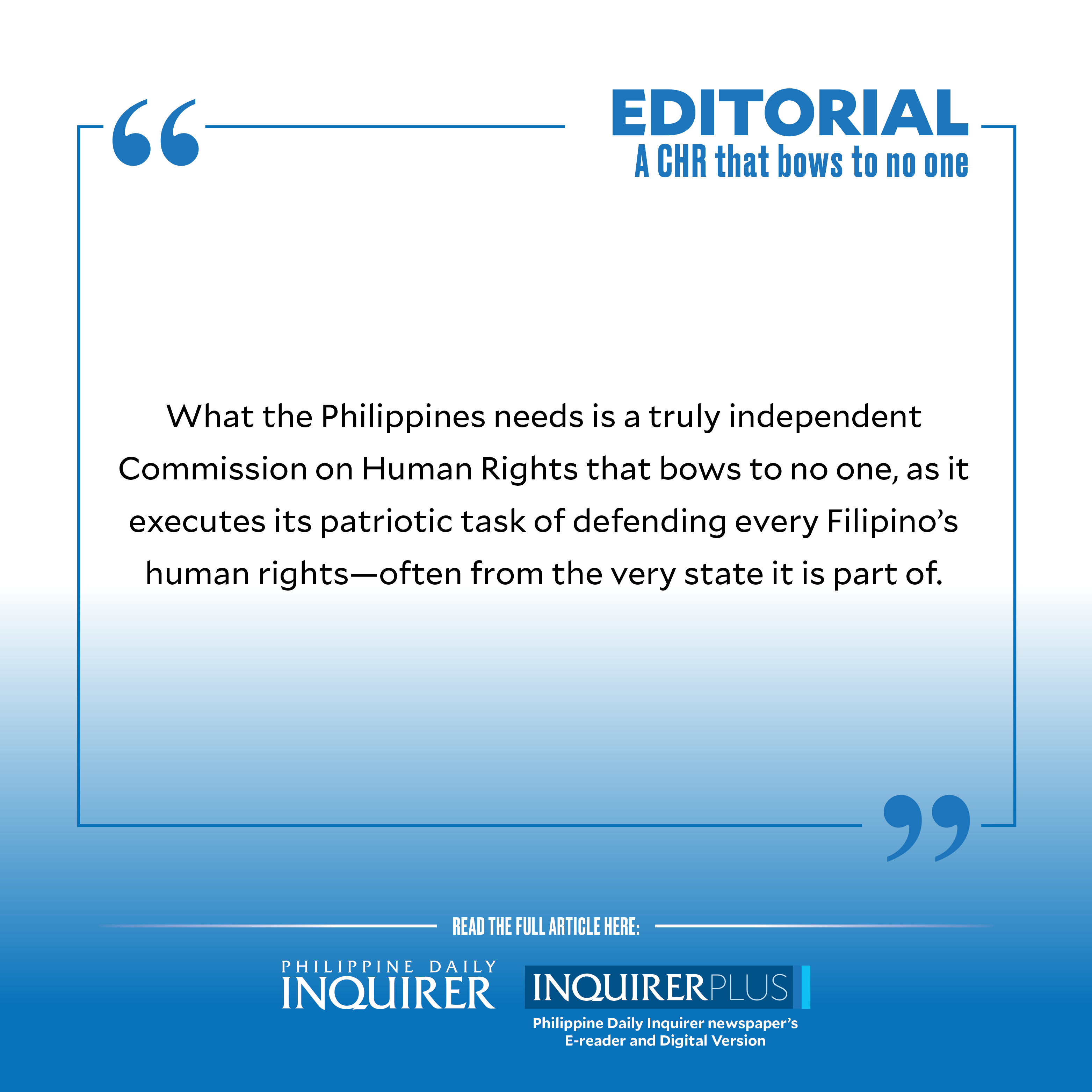A CHR that bows to no one
 As a constitutional creation, the Commission on Human Rights (CHR) is something of an anomaly. By virtue of its mandate, the commission is a one-of-a-kind public agency whose purpose is to protect the people from the state.
As a constitutional creation, the Commission on Human Rights (CHR) is something of an anomaly. By virtue of its mandate, the commission is a one-of-a-kind public agency whose purpose is to protect the people from the state.
This, it does by serving as a watchdog against violations, often committed by the government itself, of Filipinos’ rights and freedoms enshrined in the nation’s fundamental law.
Not only is the job supremely difficult to perform in a government whose leaders have populist and authoritarian leanings, it also puts the CHR in the awkward position of having to criticize the excesses of incumbent administrations, at times, bringing upon itself the wrath of appointing authorities or lawmakers armed with the power of the purse.
And it has happened on a number of occasions already.
‘Toothless’ CHR
In 2017, the House of Representatives cut the CHR budget to P1,000 after its statements calling out the Duterte administration’s bloody drug war angered legislators loyal to the president. Fortunately, the CHR budget was restored in the bicameral conference with the Senate.
Last year, the CHR was likewise threatened with a zero budget by conservative senators who wanted the rights body to categorically denounce abortion, forcing the commission to do so, with a caveat.
Such is the consequence of a “toothless” CHR with no fiscal autonomy.
Unlike the Commission on Elections, the Commission on Audit, and the Civil Service Commission, the CHR is not, strictly speaking, a “constitutional commission” that enjoys protections against external influence.
The 1987 Constitution created the CHR as an “independent office” with the power to, among others, “investigate, on its own or on complaint by any party, all forms of human rights violations involving civil and political rights” and “provide appropriate legal measures for the protection of human rights of all persons within the Philippines, as well as Filipinos residing abroad.”
Freedom from outside control
But its independence is in name only: In a November 2004 decision, the Supreme Court made it clear, on the basis of both the Constitution and the Administrative Code, that the CHR “is not among the class of constitutional commissions … Nor is there any legal basis to support the contention that the CHR enjoys fiscal autonomy.”
This is problematic for many reasons, chief of which is that it exposes the CHR to official pressure, compromising its integrity as the protector of civil liberties, in exchange for its annual funding, which stands at P934 million this year.
As the Supreme Court said in its 2004 ruling, fiscal autonomy “entails freedom from outside control and limitations, other than those provided by law.” Without it, the CHR cannot be truly autonomous in the exercise of its duties, being at the mercy of those in office whose acts might run counter to the interest of human rights.
But there’s good news.
Full fiscal autonomy
Leaders of both the House of Representatives and the Senate are now acknowledging the wisdom of giving the CHR the independence it has been denied under the Charter and jurisprudence.
House Bill No. 9790, filed by Speaker Martin Romualdez and other House leaders, expressly proposes that “the independence of the Commission on Human Rights … shall always be respected and upheld. The Commission shall enjoy full fiscal autonomy. Appropriations for the Commission shall not be reduced and shall be automatically and regularly released.”
The bill’s explanatory note states: “We need a CHR that can address the challenge of protecting and promoting the human rights of all, especially the vulnerable, the disadvantaged, and the marginalized sectors of society.”
In the other chamber, Senators Robinhood Padilla and Manuel “Lito” Lapid, with the support of Senate President Juan Miguel Zubiri, have filed counterpart bills with the common goal of instituting the CHR Charter as the country’s “national human rights institution.”
Collective commitment
Thanking the lawmakers for their support last week, CHR chair Richard Palpal-latoc said the proposed legislation “represents a collective commitment to protecting and upholding the rights and dignity of every individual in the country.”
This, indeed, is a welcome development, and we urge Congress to enact the bill as soon as possible. Time is of the essence, considering the multitude of issues confronting the CHR, from the Red-tagging of activists and critics to the extrajudicial killings and enforced disappearances of journalists, lawyers, and environmentalists, among others.
After the recent visit of United Nations Special Rapporteur Irene Khan, Human Rights Watch and Amnesty International each said the rights situation here remains dire, with persisting threats on press freedom, free speech, and other civil liberties.
What the Philippines needs, therefore, is a truly independent CHR that bows to no one, as it executes its patriotic task of defending every Filipino’s human rights—often from the very state it is part of.




















